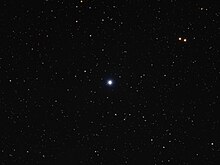Nu Cassiopeiae,[11] Latinized from ν Cassiopeiae, is a solitary[12] star in the northern constellation of Cassiopeia. With an apparent visual magnitude of +4.89,[2] it is a faint star but visible to the naked eye. Based upon an annual parallax shift of 7.92 mas as seen from Earth,[1] this star is located around 410 light years from the Sun. Cowley et al. (1969) catalogued this star with a stellar classification of B9 III,[3] indicating it has the spectrum of an evolved B-type giant star. However, Palmer et al. (1968) assigned it a class of B8 V, which would instead suggest it is an ordinary B-type main-sequence star.[4]
| Observation data Epoch J2000.0 Equinox J2000.0 (ICRS) | |
|---|---|
| Constellation | Cassiopeia |
| Right ascension | 00h 43m 28.07045s[1] |
| Declination | +47° 01′ 28.3694″[1] |
| Apparent magnitude (V) | +4.89[2] |
| Characteristics | |
| Spectral type | B9 III[3] or B8 V[4] |
| U−B color index | −0.43[5] |
| B−V color index | −0.11[5] |
| Astrometry | |
| Radial velocity (Rv) | +9.0±4.2[6] km/s |
| Proper motion (μ) | RA: +30.84±0.22[1] mas/yr Dec.: −10.02±0.18[1] mas/yr |
| Parallax (π) | 7.92 ± 0.32 mas[1] |
| Distance | 410 ± 20 ly (126 ± 5 pc) |
| Absolute magnitude (MV) | −0.60[7] |
| Details | |
| Mass | 3.90±0.07[8] M☉ |
| Luminosity | 348[8] L☉ |
| Surface gravity (log g) | 4.026±0.035[9] cgs |
| Temperature | 13,268±150[9] K |
| Rotational velocity (v sin i) | 134±17[9] km/s |
| Other designations | |
| Database references | |
| SIMBAD | data |

References
edit- ^ a b c d e f van Leeuwen, F. (2007), "Validation of the new Hipparcos reduction", Astronomy and Astrophysics, 474 (2): 653–664, arXiv:0708.1752, Bibcode:2007A&A...474..653V, doi:10.1051/0004-6361:20078357, S2CID 18759600.
- ^ a b Häggkvist, L.; Oja, T. (1966), "Photoelectric photometry of bright stars", Arkiv för Astronomi, 4: 137–163, Bibcode:1966ArA.....4..137H.
- ^ a b Cowley, A.; et al. (April 1969), "A study of the bright A stars. I. A catalogue of spectral classifications", Astronomical Journal, 74: 375–406, Bibcode:1969AJ.....74..375C, doi:10.1086/110819
- ^ a b Palmer, D. R.; et al. (1968), "The radial velocities spectral types and projected rotational velocities of 633 bright northern A stars", Royal Observatory Bulletin, 135: 385, Bibcode:1968RGOB..135..385P.
- ^ a b Crawford, D. L. (February 1963), "U, b, v, and Hβ Photometry for the Bright B8- and B9-TYPE Stars", Astrophysical Journal, 137: 530, Bibcode:1963ApJ...137..530C, doi:10.1086/147526.
- ^ de Bruijne, J. H. J.; Eilers, A.-C. (October 2012), "Radial velocities for the HIPPARCOS-Gaia Hundred-Thousand-Proper-Motion project", Astronomy & Astrophysics, 546: 14, arXiv:1208.3048, Bibcode:2012A&A...546A..61D, doi:10.1051/0004-6361/201219219, S2CID 59451347, A61.
- ^ Anderson, E.; Francis, Ch. (2012), "XHIP: An extended hipparcos compilation", Astronomy Letters, 38 (5): 331, arXiv:1108.4971, Bibcode:2012AstL...38..331A, doi:10.1134/S1063773712050015, S2CID 119257644.
- ^ a b Zorec, J.; Royer, F. (January 2012), "Rotational velocities of A-type stars. IV. Evolution of rotational velocities", Astronomy & Astrophysics, 537: A120, arXiv:1201.2052, Bibcode:2012A&A...537A.120Z, doi:10.1051/0004-6361/201117691, S2CID 55586789.
- ^ a b c Huang, Wenjin; et al. (October 2010), "A Stellar Rotation Census of B Stars: From ZAMS to TAMS", The Astrophysical Journal, 722 (1): 605–619, arXiv:1008.1761, Bibcode:2010ApJ...722..605H, doi:10.1088/0004-637X/722/1/605, S2CID 118532653.
- ^ "nu. Cas". SIMBAD. Centre de données astronomiques de Strasbourg. Retrieved 2017-08-30.
{{cite web}}: CS1 maint: postscript (link) - ^ Not to be confused with NU Cassiopeiae, an eclipsing binary of the Beta Lyrae type.
- ^ Eggleton, P. P.; Tokovinin, A. A. (September 2008), "A catalogue of multiplicity among bright stellar systems", Monthly Notices of the Royal Astronomical Society, 389 (2): 869–879, arXiv:0806.2878, Bibcode:2008MNRAS.389..869E, doi:10.1111/j.1365-2966.2008.13596.x, S2CID 14878976.
